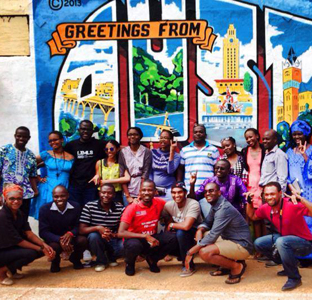Posted on June 19, 2015 by KC Gonzalez

African Entrepreneurs Visiting UTSA
“When you teach someone one thing, it really opens the door for other things,” Leffel said. “So I feel like I just open the door, they realize there’s so much to learn and build upon.”
The Young African Leaders Institute is now in its second year, bringing 500 college graduates from Africa to 50 universities across the nation to build their business ideas, most of which have a humanitarian purpose.
Last year, 25 students from 19 African countries joined Leffel for the summer, receiving four hours of instruction five days a week in entrepreneurship and innovation, as well as local cultural and volunteer experiences. Though they’ll stay in Austin for the most part, Leffel plans to immerse them in San Antonio culture on July 13th and 14th.
Leffel was very moved by the students she got to know in the program’s inaugural year.
“This was a career-changer for me,” Leffel said. “I felt the weight of the responsibility of what the students could accomplish and what the program was accomplishing.”
She was most amazed at the sight of students from very diverse African nations, many of which aren’t always the best of friends politically speaking, getting along and working together.
“Out of all the things in my UTSA career, this has made me the proudest,” Leffel said.
One of the major parts of UTSA’s program is a pitch competition the students prepare for as individuals, wherein they present their plan for a business they want to start back home.
“You have to be able to articulate what you want,” Leffel said. “Their countries aren’t quite there in terms of supporting entrepreneurship and the education of future entrepreneurs. That’s the biggest problem right now because when venture capitalists go to Africa they say their ideas are good but they don’t understand what it takes to go from A to B.”
One student of Leffel’s began the One Hen Project, inspired by his own experience as a boy. He was given a hen by his grandmother and sold the eggs it laid to pay for school. One hen became two hens, then three hens, and with that he was able to buy the things he needed and study at his university. Now, that young man gives two children in his home nation of Kenya a hen, with the caveat that at the end of the year they donate a hen back to the project to be given to someone else.
Another project provides a sterile kit for childbirth, inspired by one student’s best friend having died in childbirth, a major problem in African nations.
A third student noticed that young women were not attending school because they were menstruating and didn’t have sanitary napkins or tampons. She came up with the solution to create reusable pads out of bamboo.
Leffel sees promise in each project and gives advice on how to move forward.
“They really were projects when they arrived,” Leffel said. “But by the time they left, they were businesses.”

